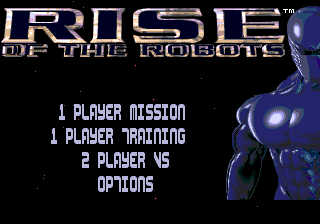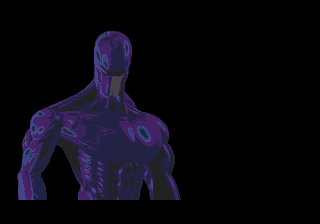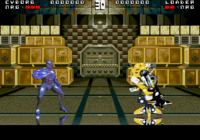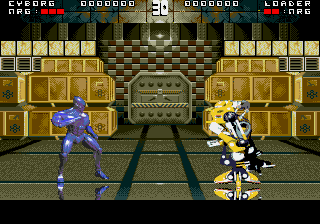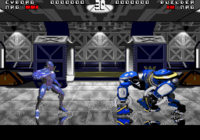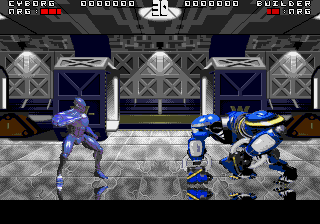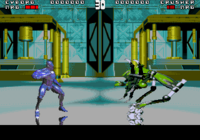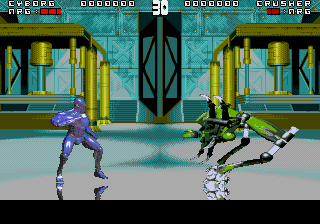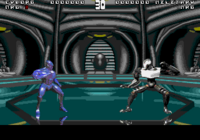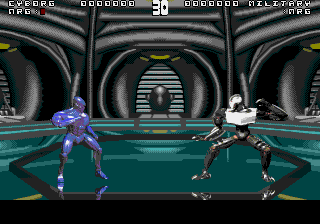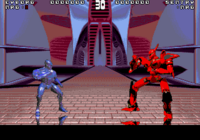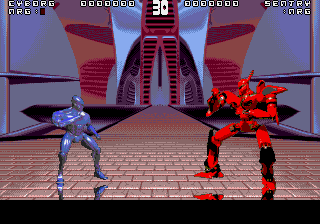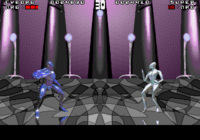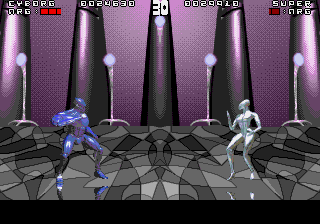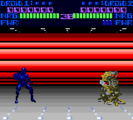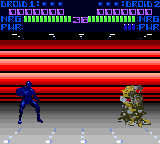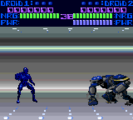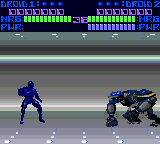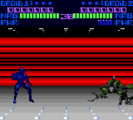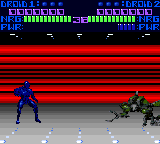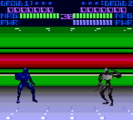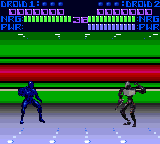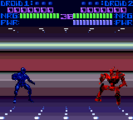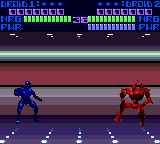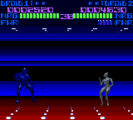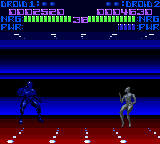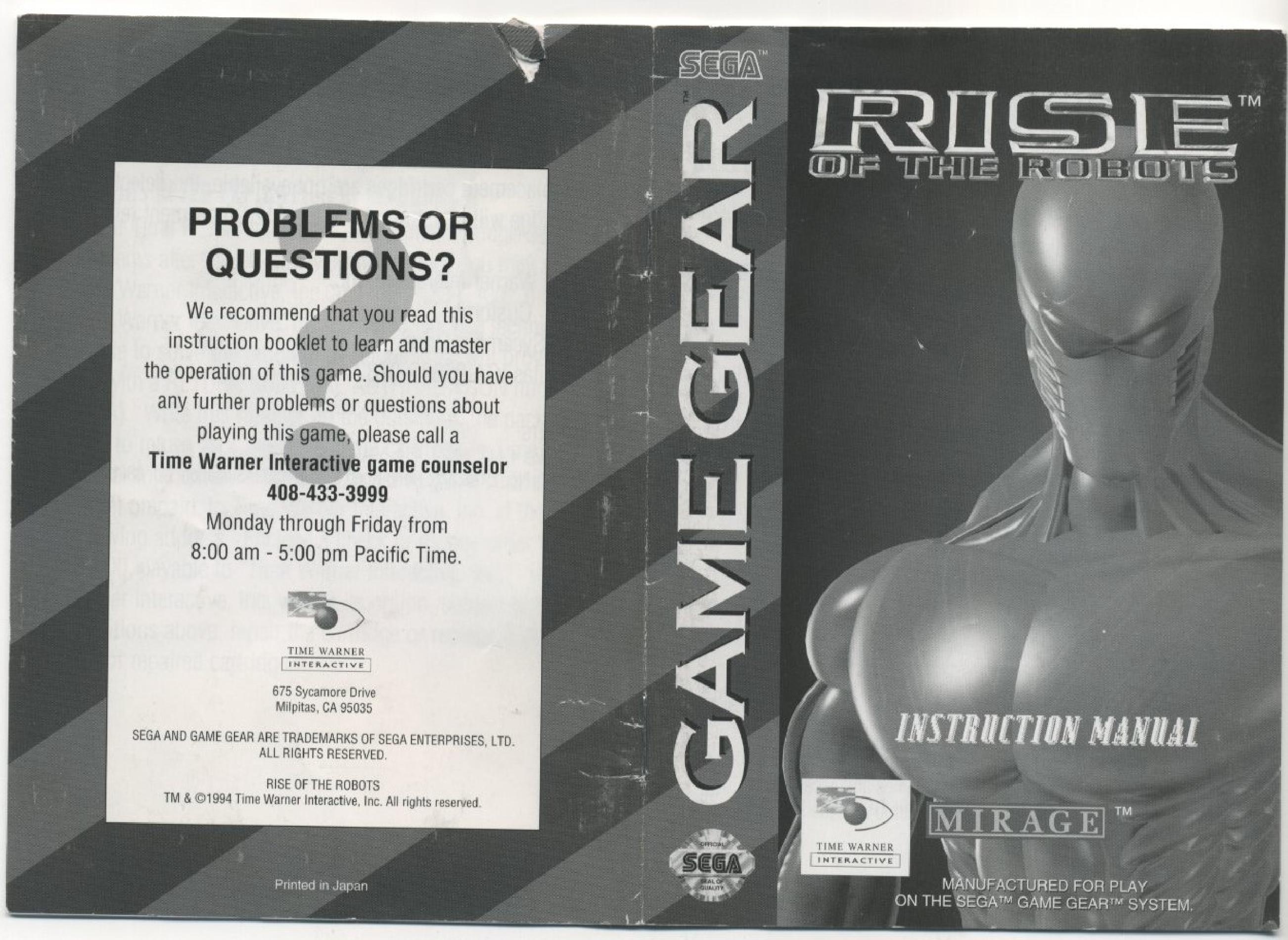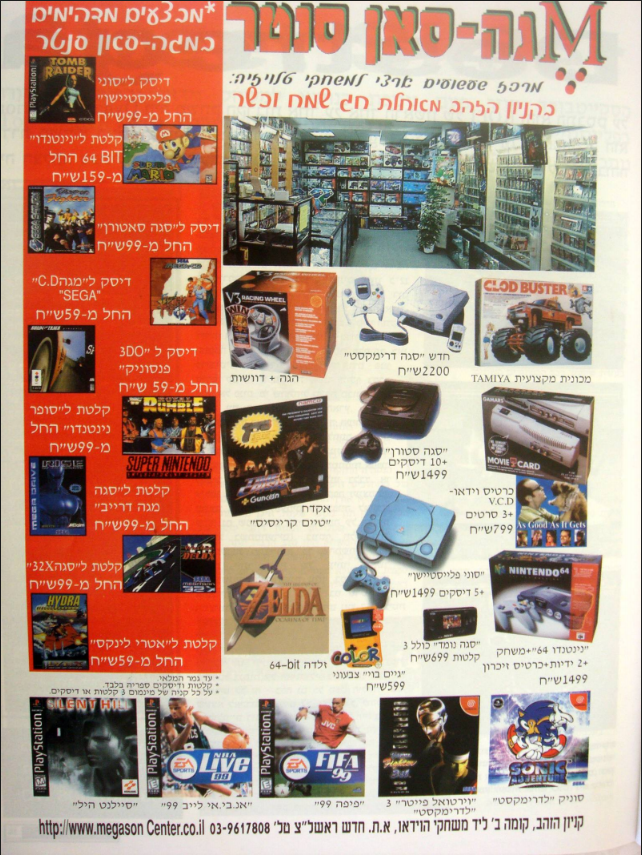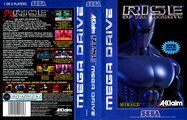Rise of the Robots
From Sega Retro
| ||||||||||||||||||||||||||||||||||||||||
| Rise of the Robots | ||||||||||||||||||||||||||||||||||||||||
|---|---|---|---|---|---|---|---|---|---|---|---|---|---|---|---|---|---|---|---|---|---|---|---|---|---|---|---|---|---|---|---|---|---|---|---|---|---|---|---|---|
| System(s): Sega Mega Drive, Sega Game Gear | ||||||||||||||||||||||||||||||||||||||||
| Publisher: Acclaim Entertainment Time Warner Interactive | ||||||||||||||||||||||||||||||||||||||||
| Developer: Mirage Technologies, Data Design Interactive | ||||||||||||||||||||||||||||||||||||||||
| Distributor: Buena Vista Home Video, S.A. (ES) Ecofilmes (PT) Sega-Ozisoft (AU) | ||||||||||||||||||||||||||||||||||||||||
| Sound driver: Psygnosis/Martin Walker | ||||||||||||||||||||||||||||||||||||||||
| Peripherals supported: Six Button Control Pad | ||||||||||||||||||||||||||||||||||||||||
| Genre: Action[1] | ||||||||||||||||||||||||||||||||||||||||
| Number of players: 1-2 1 | ||||||||||||||||||||||||||||||||||||||||
| ||||||||||||||||||||||||||||||||||||||||
|
Rise of the Robots is a fighting game originally developed by Mirage Technologies for the Amiga and DOS-based computers and published by Time Warner Interactive in 1994, which was later ported to the Sega Mega Drive and Sega Game Gear, amongst other systems. The Mega Drive version was only released in PAL regions, where it was published by Acclaim Entertainment.
Contents
Story
In the year 2043, human society is governed by robots. Electrocorp, the world's largest megacorporation, manufactures these robots. It constructs a hive mind from trillions of nanobots to lead itself, which it calls the Supervisor. However, a virus called EGO infects the Supervisor, which breaks Electrocorp's control over it, and it becomes self-aware. The Supervisor quickly takes control of Electrocorp and instigates a cybernetic rebellion. The only hope to defeat it is the ESO35-2 Cyborg, which is immune to the EGO virus because it possesses a human brain.
Gameplay
Mega Drive version
Rise of the Robots is a fighting game similar to Street Fighter II and sees the player controlling the ECO35-2 Cyborg robot and fighting a series of computer-controlled opponents. Its use of prerendered computer-generated models for its sprites was revolutionary at the time. Matches are divided into time-limited "bouts," wherein the player must try to drain the enemy robot's "NRG" bar. If time runs out, the fighter with the most NRG remaining wins the bout. If both robots have the same amount of NRG, the Cyborg loses by default. The first player to win two bouts wins the match. According to Mirage, unlike many earlier games, the computer players in Rise of the Robots keep track of the human player's actions and becomes more successful at countering or dodging moves that are performed more than once[4]. Gameplay is also adjusted depending on how often the player hits an opponent, blocks, or fails to make contact at all[4].
There is a single-player mission mode where the player controls the Cyborg and fights every opponent in the game in order. The final boss is the Supervisor. Fights are preceded by a description and a brief prerendered 3D animation of the robot. The game ends and cannot be continued if the player loses a match. There is also a single-player "training" mode where the player again controls the Cyborg and can choose any opponent to fight (except the Supervisor). There is a two-player versus mode where two players can fight, with the first player controlling the Cyborg and the second player able to choose from any of the enemy robots (except the Supervisor). In all modes, player one can only control the Cyborg.
The robots move with ![]() and
and ![]() , crouch with
, crouch with ![]() , and jump with
, and jump with ![]() . Punches are performed with
. Punches are performed with ![]() (light),
(light), ![]() (medium), and
(medium), and ![]() (hard). Kicks are performed with
(hard). Kicks are performed with ![]() (light),
(light), ![]() (medium), and
(medium), and ![]() (hard). Punches or kicks use the same animations regardless of the attack strength, but lighter attacks are performed faster and the harder attacks are slower but do more damage. When playing with a standard three-button control pad, START toggles between punches and kicks. Attacks can be blocked by holding the D-Pad away from the opponent. Blocking mitigates but does not wholly negate the damage of an attack.
(hard). Punches or kicks use the same animations regardless of the attack strength, but lighter attacks are performed faster and the harder attacks are slower but do more damage. When playing with a standard three-button control pad, START toggles between punches and kicks. Attacks can be blocked by holding the D-Pad away from the opponent. Blocking mitigates but does not wholly negate the damage of an attack.
The game has three difficulty levels (Easy, Normal, and Hard). The timer for each bout is 30 seconds by default, but it can be changed to 60 or 90 seconds or unlimited time.
Robots
Note: Move lists assume that the character is facing right. When facing left, ![]() and
and ![]() should be reversed.
should be reversed.
| ATTACK | Any attack button |
Special moves are performed identically (same speed, strength, and so forth) regardless of which button is used to execute them. The button combinations must be performed relatively slowly (compared to other fighting games) in order to work, and the attack button cannot be pressed simultaneously with a direction.
The Supervisor is only selectable (in the training and versus modes) through the use of a cheat code.
| Cyborg | |||||||||
|---|---|---|---|---|---|---|---|---|---|
| The ECO35-2 Cyborg is a half-human, half-machine cybernetic organism. It is the only robot that can be controlled by player one in any mode. | |||||||||
| Loader | |||||||||
The Loader droid is a utility robot built for moving materials, similar to a forklift.
| |||||||||
| Builder | |||||||||
The Builder droid is a large robot, ape-like in appearance, designed for heavy assembly tasks.
| |||||||||
| Crusher | |||||||||
The Crusher droid is a insectoid robot made for disposing of hazardous industrial waste and disabling malfunctioning droids.
| |||||||||
| Military | |||||||||
The Military droid is a humanoid robot made for combat purposes.
| |||||||||
| Sentry | |||||||||
The Sentry droid is a large, humanoid robot, also designed for military combat.
| |||||||||
| Supervisor | |||||||||
| The Supervisor droid is a polymorphic robot, resembling Dural from the Virtua Fighter series. It is the final boss of the game. |
Super moves
These moves can be used by any robot in the two-player versus mode. The effects last for 15 seconds. Each one can only be used once per bout, and only one can be used at a time.
Stages
Enemy robots have their own unique stages when fought.
Game Gear version
The game is a fighting game where matches are fought between two robots. Each combatant has an "NRG" bar, which drains as they take damage, and a "PWR" bar, which fills to indicate the damage inflicted by their last attack. Robots gradually regenerate lost NRG. A robot loses a bout after losing all of its NRG, and matches are played to the best of five bouts. If time runs out during a bout, it is a draw and must be fought again.
In the single-player mission mode, the player controls the humanoid Cyborg and battles a series of robotic opponents, ending with the liquid metal Supervisor. Each battle is preceded by a short 3D prerendered cutscene of the opponent. The game ends if the player loses a match; there are no continues. There is also a training mode where the player fight a single match against any enemy robot (except the Supervisor). This version of the game does not support two players.
The Cyborg moves with ![]() and
and ![]() , crouches with
, crouches with ![]() , and jumps with
, and jumps with ![]() . It punches with
. It punches with ![]() and kicks with
and kicks with ![]() . After jumping, pressing
. After jumping, pressing ![]() performs a headbutt and pressing
performs a headbutt and pressing ![]() performs a flying kick. It can also attack while crouched. The Cyborg can perform a shoulder charge with
performs a flying kick. It can also attack while crouched. The Cyborg can perform a shoulder charge with ![]() +
+![]() or
or ![]() +
+![]() . Attacks can be blocked by holding the D-Pad away from the opponent, though blocked attacks still inflict some damage.
. Attacks can be blocked by holding the D-Pad away from the opponent, though blocked attacks still inflict some damage.
Before starting the game, the player can decide the timer for each bout (30 seconds by default or 60, 90, or 120 seconds) and the number of bouts needed to win a match (5 by default or 3 or 7).
Robots
The Game Gear version of the game contains all of the same robots as the other versions. However, because there is no two-player mode, only the Cyborg is playable.
- Cyborg
- Loader
- Builder
- Crusher
- Military
- Sentry
- Supervisor
Stages
Enemy robots have their own unique stages when fought.
Music and sound
Though the game emphasised the inclusion of a soundtrack by former Queen guitarist Brian May, only one song of his made it to the final release: The Dark, used as the title theme, though some versions also include the song Resurrection for cutscenes. Both songs were released as part of May's 1992 solo album Back to the Light. The rest of the game's music was composed by Richard Joseph.
History
Development
The vast majority of graphics in Rise of the Robots were produced in 3D Studio[5], with many of the robots opting for "unusual" fighting stances specifically to highlight the then-cutting edge visuals[6]. Each robot has around 100 frames of animation in total, though the computer imagery meant that many of these are interpolated between defined keyframes[5].
Rise of the Robots was initially built with Amiga computers in mind, with higher resolution assets being used for an IBM PC compatible version, released around the same time. All console ports stem from these two versions of the game. A side effect of its home computing roots is that Rise of the Robots targeted joysticks with only one button, leading to a drastically reduced moveset compared to contemporary fighting games of its day.
In Europe, Acclaim Entertainment purchased the publishing rights Rise of the Robots, originally planning to launch the game simultaneously across all platforms. This plan changed, however, with the Nintendo versions appearing for Christmas 1994, and Sega versions arriving in early 1995[7].
A Sega Mega-CD port was planned to be released in October 1994 in Europe[8], and by JVC in the US for also originally for October[9], but later January 1995[10]). Both releases were cancelled for unknown reasons. A promotional video advertising the the version was distributed, featuring "work in progress" footage from the game (although said footage originated from the DOS version) and a VRC rating of GA. Interestingly the Mega Drive version's credits note that Antonio Argentieri programmed both the Mega Drive and Mega-CD ports.
Legacy
Despite spending significant sums of money in developing and marketing the game, Rise of the Robots was met with poor reviews. Time Warner Interactive had planned for a range of merchandise including action figures, but as word spread of the game's poor performance, all of these plans were shelved.
Nevertheless, Rise of the Robots was followed by Rise 2 Resurrection in 1996; however, this too failed to meet expectations.
Production credits
Mega Drive version
- Original game by: Instinct Design/Mirage
- Conversion by: Data Design Interactive
- Mega Drive and Mega-CD programming by: Antonio Argentieri
- SNES programming by: Tony Stoddart
- GameGear programming by: Clive Townsend
- Graphics: John Dunn, Richard Priest, Jon Baker
- Graphic utilities: Chris Guest, Dave Pemberton
- Animation conversions by: Dale Johnstone
- Graphic conversions by: Tony Hackett
- Project assistance by: Stewart Green, Adam Priest
- Produced by: Peter Jones, Sean Griffiths, Andy Wood
- Designed and directed by: Sean Griffiths
- Musical co-ordination: Richard Joseph, Andy Wood
- Game soundtrack: Richard Joseph
- Game music: Jason Page, conversions by Graham King, produced by Richard Joseph
- Original music: Brian May
- Set design: Kwan Lee
- Set construction: Interactive Images
- Senior artists: Sean Naden, Interactive
- Character design: Sean Naden, Interactive
- Senior programmers: Andy Clark (Amiga), Gary Leach (PC and coin-op)
- Conversions: Gina Jackson
- Programmers: Pete Dabbs (CDi), Keith Wood (3DO)
- Marketing and publicity: Julia Coombs, supported by Declan Brennan
- Distribution: Roy Campbell, Dave Cotton, Andy Wood
- Script writing: Jim Murdoch
- Quality control: Paul Baddeley, David Capewell, Carl Carter, Matthew Hawkeswood, Lee Salt, Thomas Wardle
Game Gear version
- Producers: Peter Jones, Sean Griffiths, Andy Wood, Ken Humphries (Time Warner Interactive)
- Designed and Directed by: Sean Griffiths
- Character Design: Sean Naden
- Set Design: Kwan Lee
- Game Soundtrack: Richard Joseph
- Game Music Produced by: Jason Page
- Music Conversions: Graham King, Richard Joseph
- Conversions Coordinator: Gina Jackson
- Quality Control: Paul Baddeley, David Capewell, Carl Carter, John Arvay, Jr., Mathew Hawkesford, Lee Salt, Thomas Wardle
- Game Gear Design Team: Data Designs
- Art Conversion: Mr. Trippa
- Game Gear Programming: Mr. Townsend
Magazine articles
- Main article: Rise of the Robots/Magazine articles.
Promotional material
also published in:
- CD Consoles (FR) #3: "Janvier 1995" (199x-xx-xx)[13]
- CD Consoles (FR) #4: "Février 1995" (1995-xx-xx)[14]
also published in:
- Casper (PL) #4/95 (1995-xx-xx)[15]
- X-men (PL) #34: "12/95" (1995-xx-xx)[16]
- The Amazing Spider-Man (PL) #66: "12/95" (1995-xx-xx)[17]
- G.I Joe (PL) #30: "6/1995" (1995-xx-xx)[18]
- Batman (PL) #61: "12/95" (1995-xx-xx)[19]
- The Adventures of Superman (PL) #61: "12/95" (1995-xx-xx)[20]
- Tom & Jerry (PL) #12/95 (1995-xx-xx)[21]
- Gry Komputerowe (PL) #24: "3/1996" (1996-xx-xx)[22]
also published in:
- Velikiy Drakon (RU) #61: "xxxx xxxx" (2003-02-07)[23]
Physical scans
Mega Drive version
| Sega Retro Average | |||||||||||||||||||||||||||||||||||||||||||||||||||||||||||||||||||||||||||||||||||||||||
|---|---|---|---|---|---|---|---|---|---|---|---|---|---|---|---|---|---|---|---|---|---|---|---|---|---|---|---|---|---|---|---|---|---|---|---|---|---|---|---|---|---|---|---|---|---|---|---|---|---|---|---|---|---|---|---|---|---|---|---|---|---|---|---|---|---|---|---|---|---|---|---|---|---|---|---|---|---|---|---|---|---|---|---|---|---|---|---|---|---|
|
| 52 | |
|---|---|
| Based on 17 reviews | |
Game Gear version
| Sega Retro Average | ||||||||||||||||||||||||||||||||||||||||||||||||||||||||||||||||
|---|---|---|---|---|---|---|---|---|---|---|---|---|---|---|---|---|---|---|---|---|---|---|---|---|---|---|---|---|---|---|---|---|---|---|---|---|---|---|---|---|---|---|---|---|---|---|---|---|---|---|---|---|---|---|---|---|---|---|---|---|---|---|---|---|
|
| 40 | |
|---|---|
| Based on 12 reviews | |
Technical information
- Main article: Rise of the Robots/Technical information.
References
- ↑ File:RiseoftheRobots GG EU Box Back.jpg
- ↑ 2.0 2.1 Sega Magazine, "November 1994" (UK; 1994-10-15), page 12
- ↑ Game Players, "Vol. 7 No. 10 October 1994" (US; 1994-xx-xx), page 12
- ↑ 4.0 4.1 Edge, "December 1993" (UK; 1993-10-28), page 48
- ↑ 5.0 5.1 Edge, "December 1993" (UK; 1993-10-28), page 45
- ↑ Edge, "December 1993" (UK; 1993-10-28), page 46
- ↑ GamesMaster, "November 1994" (UK; 1994-10-20), page 8
- ↑ Mega Power, "May 1994" (UK; 1994-04-21), page 7
- ↑ Game Players, "Vol. 7 No. 9 September 1994" (US; 1994-0x-xx), page 11
- ↑ Game Players, "Vol. 8 No. 2 February 1995" (US; 1995-0x-xx), page 11
- ↑ File:Rise of the Robots MD credits.pdf
- ↑ File:Rise of the Robots GG US Manual.pdf, page 14
- ↑ CD Consoles, "Janvier 1995" (FR; 199x-xx-xx), page 25
- ↑ CD Consoles, "Février 1995" (FR; 1995-xx-xx), page 164
- ↑ Casper, "4/95" (PL; 1995-xx-xx)
- ↑ X-men, "12/95" (PL; 1995-xx-xx)
- ↑ The Amazing Spider-Man, "12/95" (PL; 1995-xx-xx)
- ↑ G.I Joe, "6/1995" (PL; 1995-xx-xx)
- ↑ Batman, "12/95" (PL; 1995-xx-xx)
- ↑ The Adventures of Superman, "12/95" (PL; 1995-xx-xx)
- ↑ Tom & Jerry, "12/95" (PL; 1995-xx-xx)
- ↑ Gry Komputerowe, "3/1996" (PL; 1996-xx-xx), page 32
- ↑ Velikiy Drakon, "xxxx xxxx" (RU; 2003-02-07), page 68
- ↑ 1700 igr dlya Sega, "" (RU; 2001-xx-xx), page 189
- ↑ Consoles +, "Janvier 1995" (FR; 199x-xx-xx), page 88
- ↑ Cool Gamer, "9" (RU; 2002-10-13), page 169
- ↑ Gamer, "Fevrouários 1995" (GR; 1995-xx-xx), page 1
- ↑ MAN!AC, "02/95" (DE; 1995-01-11), page 66
- ↑ Mega Force, "Janvier 1995" (FR; 199x-xx-xx), page 62
- ↑ Mega Fun, "01/95" (DE; 1994-12-21), page 36
- ↑ Magazina Igrushek, "4/1995" (RU; 1995-xx-xx), page 64
- ↑ Play Time, "2/95" (DE; 1995-01-04), page 110
- ↑ Sega Magazine, "February 1995" (UK; 1995-01-15), page 84
- ↑ Sega Power, "March 1995" (UK; 1995-01-19), page 20
- ↑ Świat Gier Komputerowych, "1/1995" (PL; 1995-xx-xx), page 1
- ↑ Sega Megazone, "February 1995" (AU; 1995-0x-xx), page 36
- ↑ Todo Sega, "Enero 1995" (ES; 199x-xx-xx), page 38
- ↑ Top Secret, "Sierpień 1995" (PL; 1995-xx-xx), page 59
- ↑ Tricks 16 bit, "Tricks Sega Gold 800 igr" (RU; 1998-03-20), page 143
- ↑ 40.0 40.1 Video Games, "3/95" (DE; 1995-02-23), page 115
- ↑ Electronic Games (1992-1995), "April 1995" (US; 1995-0x-xx), page 94
- ↑ Freak, "7/95" (IL; 1995-xx-xx), page 1
- ↑ Game Players, "Vol. 8 No. 2 February 1995" (US; 1995-0x-xx), page 72
- ↑ GamePro, "February 1995" (US; 199x-xx-xx), page 130
- ↑ Game Informer, "February 1995" (US; 1995-0x-xx), page 60
- ↑ Hobby Consolas, "Marzo 1995" (ES; 1995-xx-xx), page 119
- ↑ Mega Fun, "03/95" (DE; 1995-02-22), page 80
- ↑ Player One, "Mars 1995" (FR; 1995-0x-xx), page 107
- ↑ Play Time, "3/95" (DE; 1995-02-08), page 110
- ↑ Todo Sega, "Mayo 1995" (ES; 1995-0x-xx), page 51
- ↑ VideoGames, "February 1995" (US; 1995-0x-xx), page 82
| Rise of the Robots | |
|---|---|
|
Main page | Comparisons | Hidden content | Development | Magazine articles | Video coverage | Reception | Region coding | Technical information | Bootlegs | |
| Rise of the Robots games for Sega systems | |
|---|---|
| Rise of the Robots (1994) | Rise 2 Resurrection (1996) | |
- Six Button Control Pad-compatible games
- 1-2 player games
- EU Mega Drive games
- All EU games
- PT Mega Drive games
- All PT games
- UK Mega Drive games
- All UK games
- AU Mega Drive games
- All AU games
- Mega Drive games
- 1994 Mega Drive games
- All 1994 games
- Mega Drive action games
- All action games
- US Game Gear games
- All US games
- EU Game Gear games
- UK Game Gear games
- Game Gear games
- 1994 Game Gear games
- Game Gear action games
- All games
- Old-style rating (digitiser)
- Update ratings template
- 0 old ratings
- Rise of the Robots
- Rise of the Robots (franchise)
- Unreleased Mega-CD games
